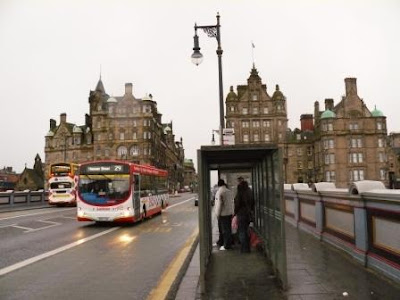
În ziua de
Adormirea Maicii Domnului – socotită, între altele protectoarea marinarilor – în portul Constanţa apare
Zeul Neptun, ca să-i binecuvânteze pe navigatorii acestei ţări
a cărei Flotă a fost vândută la fier vechi de aproape două decenii.
„
Fie ca tridentul să domolească ori de câte ori este nevoie zbuciumul apelor şi, prin mărinimia sa, furtuna să ocolească navele româneşti, oriunde vor naviga!“, a urat actorul-zeu (
lect. univ. dr. în viaţa reală!), agitând o furcă de recuzită.
Cam în acelaşi moment al zilei (înaintea prânzului), în toate cele peste 14,574 de biserici ortodoxe din România (câte erau la recensământul din 2002), credincioşii rosteau: “
Preasfântă Născătoare de Dumnezeu, miluieşte-ne pe noi!”
Şi nu doar în acea duminică, care reprezintă cea mai mare sărbătoare care încheie
Anul bisericesc, ci în toate duminicile, o turmă mică (dar şi aceasta sfâşiată de lupi răpitori!) din întregul naţiunii române se află la
Sfânta Liturghie.
Pentru restul, turma mai mare (dar purtătoare a Botezului ortodox), oricum duminica era o zi potrivită pentru a se duce oriunde altundeva decât într-o biserică. Şi de ce nu să se afle pe malul mării, la această
sărbătoare laico-păgânească?
Ocazie minunată
de a mai arunca nişte huiduieli Cârmaciului ţării, poate în acelaşi timp în care, în biserici, se rostea ectenia pentru „cârmuitorii
ţării noastre, pentru mai marii oraşelor şi ai satelor”, în prezenţa unor oameni tot la fel de nemulţumiţi.
Dar nu pentru că au fost minţiti şi “
nu trăiesc bine”. Cei care cred în Hristos într-adevăr – nu au o vagă relaţie cu un
hristos caricaturizat, precum turma cea mare – doar nu îşi pun încrederea “
în cei puternici, în fiii oamenilor, întru care nu este mântuire”.
Creştinii ar putea fi, cel mult, îndureraţi şi revoltaţi de tot mai multele politici şi declaraţii
anticreştine (vezi
aici,
aici sau
aici) ale cârmuirii de Dumnezeu îngăduite asupra noastră, dar nu să-i reproşeze lipsa
traiului bun.
Cei cărora nu le pasă decât că “
nu trăiesc bine”, nici nu vor înţelege de ce lucrurile merg tot mai rău pentru naţiunea aceasta. A le vorbi despre
milioanele de avorturi de după 1989, a numi
desfrânare promiscuitatea socotită
normală astăzi nu pare să mai aibe vreun efect.

Nici a încerca să le explici că toate nenorocirile abătute asupra noastră de 21 de ani încoace (plus cele mult mai mari care vor veni!) sunt rezultatul consecinţelor, luate la un loc, ale păcatelor fiecăruia dintre noi cei vii (plus ale celor plecaţi dintre noi) nu pare mai de folos.
Cei credincioşi se mai tem încă, măcar la nivel teoretic, de
păcat. Restul naţiunii române a decăzut din turma de credincioşi într-o haită câini vagabonzi, căci, fără Hristos, oricine a primit Botezul în numele Lui rămâne un vagabond!
Latră unii la alţii, se muşcă chiar, se urăsc şi pun mereu vina pe
Cârmaci şi acoliţii lui pentru orice, dar au pierdut noţiunea de păcat tot atât de mult precum britanicii, de pildă. Fără
a simţi ne păcatul, nu există pocăinţă, aşadar nici şansă de mântuire.
Până la înţelegerea noţiunii de pocăinţă – deficitară şi între credincioşi, dintre care primul aflat
în deficit mă pot socoti chiar eu! – lipsa conceptului de
păcat din viaţa de zi cu zi întunecă mintea, încâlceşte gândurile, fiind o formă de sclavie.
Oamenii care nu înţeleg
cum stă treaba cu păcatul nu pot decât să dea vina pe alţii (de la preoţi la politicieni, profesori, bogaţi până la părinţi, rude etc), dar nu să mai înţeleagă de ce se dezintegrează de la o zi la alta naţiunea română.
Destule din cele scrise –
[RO] aici,
aici,
aici,
aici &
[EN] here,
here,
here,
here,
here – despre
decreştinarea britanicilor se pot potrivi foarte bine şi românilor. Nu cred că mileniul de erezii sau o jumătate de veac de regim ateu ne-ar putea folosi drept
scuză unora sau altora.
Dacă aceste rânduri ale mele nu lasă multe speranţe legate de viitorul acestei naţiuni aflate în pulverizare accelerată, celor care mai au un dram de minte sănătoasă, le amintesc că mai avem motive de încredere în
Sfinţi înaintaşi!
Aparent mai vagi decât ne par certitudinile lumeşti după care gonim bezmetici, dar, în esenţă, mai tari decât slăbănogirea noastră sufletească, ar putea fi pentru noi rugăciunile
Sfinţilor Brâncoveni. În ajutorul lor să ne punem nădejdea mai mult decât ne putem încrede în noi înşine!
Poate că acest
exemplu viu al Sfântului Radu şi al familiei Brâncovenilor – zugrăvit de un frate în Hristos al cărui
site îl recomand din toată inima! – mai poate servi drept răspuns la întrebarea “
ce este de făcut?” în aceste vremuri.
[Pentru toate postările de pe acest blog mergi la/For all the posts on this blog go to: Contents/Cuprins]
 People waiting orderly and patiently in a queue, wherever and whenever, is known to be a quintesentially British thing.
People waiting orderly and patiently in a queue, wherever and whenever, is known to be a quintesentially British thing.  Apart from these, especially designed pieces of urban furniture try to manage the crowds. I have already given a example, and here’s another one – a bus shelter where passengers can wait in line on one of the windy bridges of Edinburgh.
Apart from these, especially designed pieces of urban furniture try to manage the crowds. I have already given a example, and here’s another one – a bus shelter where passengers can wait in line on one of the windy bridges of Edinburgh.






























